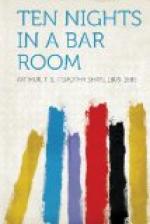From the constant stream of human beings that flowed toward the “Sickle and Sheaf,” after the news of Green’s discovery and death went forth, it seemed as if every man and boy within a distance of two or three miles had received intelligence of the event. Few, very, of those who came, but went first into the bar-room; and nearly all who entered the bar-room called for liquor. In an hour after the death of Green, the fact that his dead body was laid out in the room immediately adjoining, seemed utterly to pass from the consciousness of every one in the bar. The calls for liquor were incessant; and, as the excitement of drink increased, voices grew louder, and oaths more plentiful, while the sounds of laughter ceased not for an instant.
“They’re giving him a regular Irish wake,” I heard remarked, with a brutal laugh.
I turned to the speaker, and, to my great surprise, saw that it was Judge Lyman, more under the influence of drink than I remembered to have seen him. He was about the last man I expected to find here. If he knew of the strong indignation expressed toward him a little while before, by some of the very men now excited with liquor, his own free drinking had extinguished fear.
“Yes, curse him!” was the answer. “If they have a particularly hot corner ‘away down below,’ I hope he’s made its acquaintance before this.”
“Most likely he’s smelled brimstone,” chuckled the judge.
“Smelled it! If old Clubfoot hasn’t treated him with a brimstone-bath long before this, he hasn’t done his duty. If I thought as much, I’d vote for sending his majesty a remonstrance forthwith.”
“Ha! ha!” laughed the judge. “You’re warm on the subject.”
“Ain’t I? The blackleg scoundrel! Hell’s too good for him.”
“H-u-s-h! Don’t let your indignation run into profanity,” said Judge Lyman, trying to assume a serious air; but the muscles of his face but feebly obeyed his will’s feeble effort.
“Profanity! Poh! I don’t call that profanity. It’s only speaking out in meeting, as they say,—it’s only calling black, black—and white, white. You believe in a hell, don’t you, judge?”
“I suppose there is one; though I don’t know very certain.”
“You’d better be certain!” said the other, meaningly.
“Why so?”
“Oh! because if there is one, and you don’t cut your cards a little differently, you’ll be apt to find it at the end of your journey.”
“What do you mean by that?” asked the judge, retreating somewhat into himself, and trying to look dignified.
“Just what I say,” was unhesitatingly answered.
“Do you mean to insinuate any thing?” asked the judge, whose brows were beginning to knit themselves.
“Nobody thinks you a saint,” replied the man, roughly.
“I never professed to be.”
“And it is said”—the man fixed his gaze almost insultingly upon Judge Lyman’s face—“that you’ll get about as hot a corner in the lower regions as is to be found there, whenever you make the journey in that direction.”




